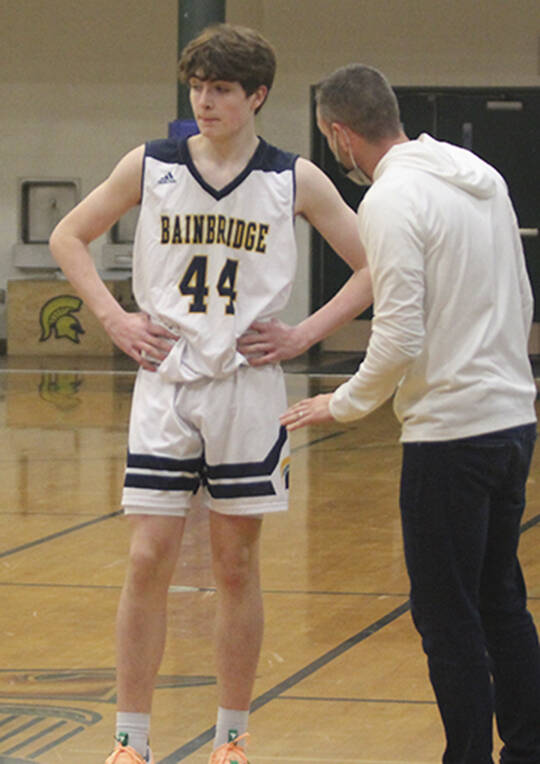Bainbridge High School’s fiery boys basketball coach is going to be less so starting next year.
Steve Haizlip has committed to being more positive after receiving complaints from parents, players, former players and even assistant coaches.
One of the parents, Nate Durrance, wrote a letter to the school board and superintendent Peter Bang-Knudsen asking them to remove Haizlip due to him violating the district’s Harassment, Intimidation and Bullying (HIB) policy. “I have been informed that numerous other families (possibly 10 or more) have submitted letters or complaints and dozens of talented kids have quit the program over the years because of Haizlip’s treatment,” Durrance says in an email to the Review.
A letter to the district says many others would speak up but they fear retaliation from Haizlip and his wife, former principal and current district administrator Kristen Haizlip. Now that she is no longer principal many are more open to talking, he adds.
New principal Kristina Rodgers replied to Durrance in a letter that says the district did an investigation and found no violation of the HIB policy. But in recognition of the complaints, the district follow-up will include training for coaches to align with the district improvement plan with a specific focus on fostering and maintaining an environment that creates identity safety and considers social-emotional needs of student-athletes.
Also, coaches will be taught strategies to allow players to share information that would help coaches differentiate their approach to support individuals. Rodgers’ letter also states that investigation results would be shared with Haizlip, and all would be informed of the district’s anti-retaliation policy.
Bang-Knudsen said he could not talk to the Review because it’s a personnel matter. He would only say, “We are aware that concerns have been raised relating to the boys basketball program. The district is working to address those concerns, and to support the program moving forward.” The athletic director, school board members, Rodgers and Haizlip also would not respond to an email asking for comment.
However, Bang-Knudsen did reply to Durrance in a letter, saying he agrees with Rodgers that Haizlip did not violate the HIB policy. His letter says, in part:
That after interviewing players, assistant coaches and Haizlip there was no intentional act at any one player, but actions were made to motivate the team to perform better. However, Bang-Knudsen continues saying Haizlip must use a more positive approach, and the coach is committed to improving his communication with players. Haizlip also will be committed to using team-bonding strategies. Rodgers and the athletic director will work closely with Haizlip to make sure those changes are made.
While Durrance asks for Haizlip to be removed from coaching, Bang-Knudsen says the district’s approach in most cases is to provide feedback and direction for improvement. Durrance claimed that is not true. “The district has asked many coaches with far fewer and far-less severe grievances to step down.”
Another of his emails says the district has failed for years: to put kids first; treat coaches the same; view coaches as educators; ensure coaches are good role models; remove bad coaches; and check on programs, especially when kids are quitting. “It’s about a failed philosophy and system at the district more than just about one bad coach,” his email says.
Durrance’s letter to the district says Haizlip constantly yells at players, relies on fear as a coaching style and models poor behavior.
Durrance did a public information request on the district’s investigation. He obtained a copy of the responses, which included: “Coach style is negative reinforcement. You do stuff not to get yelled at. Intense. Loud;” “Hard coach to like;” “Was extreme in his reactions, more about frustration than player improvement;” “Yelling, it does feel very personal when he does it;” “He is trying to correct play but he doesn’t know how to do it well without humiliating—needs a better way to communicate mistakes;” ”Demeaning comments, yeah that’s pretty common;” “Have to have confidence to play bball and that was one thing I don’t think H instilled in us, confidence. We were afraid of messing up.” One player said off-season Haizlip is a nice guy, but in season he’s “demoralizing.”
Even Haizlip’s assistant coaches said things like: “One player told me his style looks childish, and I don’t respect it, and I agreed with him 100%.” Another comment, “Could see how some would not feel safe.”
Durrance’s letter adds, “Coach Haizlip’s poor sportsmanship and terrible role modeling for our children cannot be tolerated.” He goes on to say: “No teacher would be able to talk to students the way he does…Our society has evolved, and we are far beyond the methods of decades past where coaches would talk to kids this way.” Durrance’s letter says while other BHS teams do well, basketball underperforms and kids don’t play due to the coach.
Another parent, Patricia Intihar, is mentioned in the letter as saying that on Senior Night the coach gave the players a tongue lashing even though they were ahead by 30 points at halftime, ruining that special night for them.
In a letter to Rodgers, Durrance says the district’s own policies forbid such behavior. Prohibited Uncivil Conduct 4100 says, in part: “A safe and civil environment is essential to student achievement…disruptive behavior can interfere with a student’s capacity to learn…”
Durrance has filed an appeal to the school board, including Mark Emerson, Christina Hulet, Sanjay Pal, Lynn Smith and Mike Spence.



